#Poland Interior Minister Mariusz Kaminski
Text
Exploring Kraków
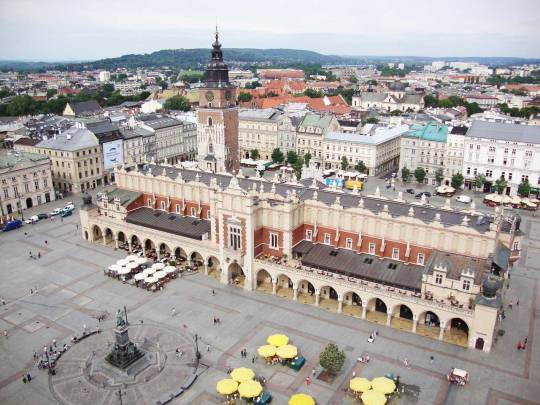
View On WordPress
#2024 EU Parliamentary Elections#European Commission#European Parliament#European Union#Kazimierz Ghetto Square#Kraków Old Town#Kraków Poland#Kraków UNESCO World Heritage List#Nationalist Law and Justice (PiS) Party#Oregon Ice Storm January 2024#Podgórze District Jewish Ghetto Quarter#Poland Deputy Interior Minister Maciej Wasik#Poland Interior Minister Mariusz Kaminski#Poland President Andrzej Duda#Poland Prime Minister Donald Tusk#Polish Civic Platform Party#Polish Commission of Inquiry Into Russian Influence on Poland’s Internal Security#Polish Constitutional Council#Polish Press Freedom#Polish Trucker Poland / Ukraine Border Protest#Reporters Without Borders (RSF)#United States and NATO#Vistula River
0 notes
Text
Two top PiS politicians, one of them the former interior minister, are jailed, in what could become a major battleground for the former ruling party as it attempts to force early elections.
On Wednesday morning, the former Polish interior minister Mariusz Kaminski and his ex-deputy, Maciej Wasik, woke up in prison in eastern Warsaw after the police had spent the better part of the previous day trying to arrest the duo to serve sentences for crimes they have already been found guilty of, but for which the opposition claim they should not be imprisoned.
On Tuesday, the police tried to implement a court order to arrest the two Law and Justice (PiS) politicians, who were sentenced in December 2023 to two years in prison for abuse of power committed in 2007 while running the Central Anti-Corruption Bureau (CBA), but the move turned into something out of a political thriller.
With PiS politicians protesting the arrest warrants, and Kaminski and Wasik themselves arguing they are “political prisoners”, the PiS-allied President Andrzej Duda invited the two to a ceremony at the Presidential Palace, taking photos with them as police officers were busy searching their homes in another part of the Polish capital.
Kaminski and Wasik ended up spending the whole day at the Presidential Palace. And it was only in the evening, at around 19:30, that the police decided to enter the palace and arrest the two.
Duda and his supporters point to the fact that the two politicians were pardoned by the president shortly after the populist-conservative PiS came to power in 2015. However, the Supreme Court, the new government that won the October election and legal experts argue that the president’s act has no legal consequences, as the original 2015 court ruling had not yet been made final (only the December 2023 ruling was final).
This is one of several flashpoints many had foreseen when the alliance of three opposition parties won Poland’s October 15 general election and promised to reverse many of what opponents regard as PiS’s anti-democratic policies.
The stakes for the PiS camp and Poland could not be higher. On the one hand, with the new government setting up three separate parliamentary commissions to investigate potential abuses by the previous PiS government – including the use of the Pegasus surveillance software to spy on political opponents – many of its politicians fear going to jail themselves eventually. More immediately, observers are warning that PiS could try to use the arrests of Kaminski and Wasik to force an early election just months after it lost the previous one.
‘Political prisoners’
Kaminski and Wasik were elected to parliament on the PiS list in the October general election, but in December the two politicians were convicted for orchestrating a scheme, including the use of intelligence agents and falsifying of documents, designed to bring down a political opponent. The two argued they were “fighting corruption”; the judge ruled the means used were illegal. The sentence is final.
Szymon Holownia, the marshal of the Sejm, declared their mandates were invalidated by the court ruling and terminated their voting privileges. However, PiS insists the two should remain in parliament and can vote.
A chamber of the Supreme Court ruled on Wednesday that Kaminski was indeed no longer an MP after Kaminski had appealed Holownia’s decision.
Kaminski and Wasik themselves had announced their intention to vote during a new parliamentary session that was set to begin on Wednesday, but which Holownia has since postponed to next week.
Crucially, parliament has to vote on a new budget in this coming session, and the new government has only until the end of January to bring the budget to President Duda for approval. Duda, who cannot veto the budget, can nevertheless send it to the Constitutional Tribunal in the event he has legal doubts and thus delay its adoption. Experts say Duda could invoke the exclusion of the two PiS politicians from voting as a reason to send the budget to the Constitutional Tribunal, which the EU regards as an illegitimate and politicised body after PiS appointed its allies to it.
In such a scenario, Duda could eventually claim the deadline for adopting the budget has been breached and call for an early parliamentary election.
While both sides of the political camp await the next developments, PiS has been mobilising to push a narrative in which it is depicting the attempts by the new government to “clean up” after PiS as totalitarian acts, with the former ruling party now a persecuted minority.
There was a similar flashpoint when the new government in December changed the leadership of public media channels, which during PiS’s eight years in power had become government mouthpieces. PiS and its friendly journalists organised occupations of some of these media institutions, while hundreds of supporters protested outside.
On Tuesday night, PiS politicians, including leader Jaroslaw Kaczynski, showed up at the police station and called on their supporters to join them. Hundreds also protested in front of the Presidential Palace. Later that evening, Kaczynski went to the detention centre where Kaminski and Wasik are being held. On Wednesday morning, some Polish media reported Kaminski had gone on hunger strike.
“It is an unprecedented scandal that Mariusz Kaminski and Maciej Wasik are in prison,” Kaczynski told supporters. “They are the first political prisoners in Poland since 1989. Those who are responsible for this will suffer the consequences.”
Jacek Sasin, a former PiS minister, called the arrests a “coup d’etat”, while PiS euro-parliamentarian Zdislaw Krasnodebski described Tuesday night’s events as a “police attack on the Presidential Palace.”
Key politicians in PiS are now calling on supporters to protest in Warsaw on Thursday afternoon, and local structures of the party have been engaged for days in organizing transport from across the country for those willing to attend.
According to a press statement issued on Wednesday morning, PiS representatives say they expect tens of thousands to attend.
20 notes
·
View notes
Text
Polish police have arrested the former interior minister and deputy interior minister inside the presidential palace in Warsaw in a day of unprecedented political theatre.
Mariusz Kaminski and Maciej Wasik were sentenced to two years' jail last month for abuse of power when they led an anti-corruption office in 2007.
Following the arrests, the new interior minister Marcin Kierwinski wrote on X: "Everyone is equal before the law."
The arrests highlight the political turmoil between the Law and Justice (PiS) party and the new pro-EU coalition.
The men, who were elected PiS MPs in October, refused to recognise last month's court decision because President Andrzej Duda, a PiS ally, pardoned them for the crime in 2015. Mr Duda has also said he does not recognise the court's ruling because he insists his pardon remains valid.
The Polish president said in a televised address on Wednesday that he was deeply shaken by the two men being jailed, and described them as honest.
The two MPs have been stripped of their parliamentary mandates, but both they and President Duda insist they remain legally elected MPs because of the pardon.
On Monday evening, the court issued a warrant to police to detain the men. Despite this, Mr Duda invited both to Warsaw's Presidential Palace on Tuesday morning to attend a ceremony to swear in two of their former colleagues as presidential advisers.
Several hours later, they emerged from the palace to speak briefly to reporters, all the while remaining inside its grounds. Mr Kaminski said they will be "political prisoners" if they are arrested and thanked Mr Duda for his support.
"We are dealing with a very serious state crisis. A grim dictatorship is being created," Mr Kaminski said. They then returned inside the palace as the political theatre unfolded.
Moments later, Prime Minister Donald Tusk told a news conference the situation was "unbelievable". He said the court's ruling must be respected and suggested President Duda was helping the men evade justice.
"There is no rulebook for the prime minister or interior minister on how to act when convicts are in the Presidential Palace. This is clearly taking advantage of a situation in which no one will use force against such an institution as the president," he added.
Following the arrests, several hundred PiS supporters demonstrated outside the palace in support of the men.
On Wednesday morning, Mariusz Kaminski announced he was going on hunger strike, "as a political prisoner, from the first day of my imprisonment". Hunger strikes are not an uncommon form of protest in Poland, and they do not necessarily mean a refusal to accept all food and liquids.
The deputy justice minister stressed that neither of the men was a political prisoner but any prisoner had the right to refuse food or drink if they wished.
Last year, the Polish Supreme Court ruled Mr Duda's 2015 pardon was invalid because it was issued while the men were appealing against their conviction, ie before the original conviction was final. Mr Duda disputes that and insists the pardon is still binding.
To complicate matters, the Constitutional Tribunal and a new Supreme Court chamber, both of which are staffed by judges nominated by PiS, have ruled in favour of Mr Duda.
Mr Tusk said Mr Duda could resolve the stand-off by pardoning the men again, now that the ruling is final. But that would call into question the legal status of the initial pardon.
Mr Tusk's coalition took office last month pledging to undo PiS's changes to the judiciary, public media, and civil service that the European Commission and many other international bodies say have undermined the rule of law in Poland.
One of its first acts was to reform the state TV, radio and news agency that PiS had transformed into a propaganda mouthpiece for its government.
But its methods were similar to PiS's, first using a government minister to sack media boards and install new people ahead of planned legislative reform.
The Helsinki Foundation for Human Rights acknowledged PiS had made it legally difficult to reform the public media, which it said required "urgent reform" because it had become "a propaganda mouthpiece" under PiS, but said the new government's changes "raise serious doubts".
Former PiS prime minister Mateusz Morawiecki told the BBC Mr Tusk's government talked loudly about democratic standards but fell well short in practice.
"We are witnessing an unprecedented attack on the rule of law. Tusk's government decided it could take over public television and media by force. This has nothing to do with democratic standards. We have not seen such brutal government action since communism. It is all the more outrageous that this is done by people who have such slogans of democracy on their lips," Mr Morawiecki said.
Given PiS's record of controlling state institutions while in office, many Tusk supporters argue such accusations are the height of hypocrisy.
5 notes
·
View notes
Text
Polish police arrest MPs, conflict between Tusk and Duda heats up
Police entered Poland’s presidential palace on Tuesday to detain two of its former leaders, Mariusz Kaminski and Maciej Wasik, fulfilling a court order to imprison the former interior minister and his deputy and escalating the conflict between the head of state and the new government, RMF 24 reports.
Earlier, Prime Minister Donald Tusk accused President Andrzej Duda of obstruction of justice after the two lawmakers appeared at the palace, prompting police to search for them in cars driving away from the building.
After coming to power in October elections, Tusk, a former top European Union official, vowed to reverse the policies of his predecessors, the Law and Justice (PiS) party, who faced accusations of undermining democracy during their eight-year rule.
New Interior Minister Marcin Kierwinski said “everyone is equal before the law”.
Read more HERE
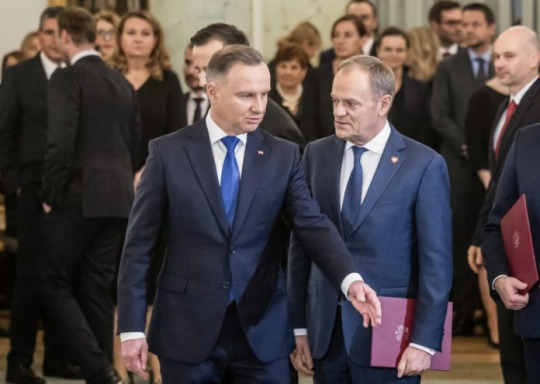
#world news#world politics#news#europe#european news#european union#eu politics#eu news#poland#poland news#poland politics#polska#warsaw#andrzej duda#tusk#donald tusk
0 notes
Text
Poland Imposes EU Ban on All Russian-Registered Passenger Cars
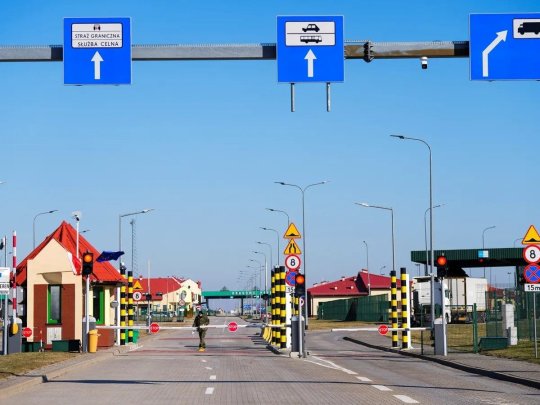
In a decisive move, Poland has recently enacted an essential European Union (EU) sanction that prohibits all Russian-registered passenger cars from entering its territory. This decision is a significant development in the ongoing geopolitical tension surrounding Russia's involvement in the Ukraine conflict. The ban, initiated in line with the broader sanctions imposed on Russia by the EU, is a manifestation of the collective stance adopted by EU member states against Russia's actions.
The EU's decision to bar motor vehicles registered in the Russian Federation from entering its territory underscores the gravity of the situation in Eastern Europe. The move reflects the EU's commitment to holding Russia accountable for its role in the Ukraine crisis. The ban is not merely a symbolic gesture but a concrete measure aimed at exerting economic pressure on Russia and its citizens.
The announcement of this ban came from Polish Interior Minister Mariusz Kaminski, who affirmed, "A car registered in Russia has no right to enter Poland." The ban took effect swiftly, commencing at midnight after the announcement. This action is part of a broader strategy to respond to the Ukraine conflict, primarily driven by the EU's perception of Russia as a current threat to international security.
Poland's decision to implement this ban aligns with the actions of other neighboring Baltic states, namely Lithuania, Latvia, and Estonia, which have similarly prohibited vehicles with Russian license plates from entering their territories. This unified response underscores the solidarity and cohesion within the EU, demonstrating a coordinated approach to addressing the crisis.
The timing of this ban is significant, coming just days after a joint interpretation of EU sanctions on Moscow by the Baltic states. Poland, along with the Baltic states, has been at the forefront of European criticism of Russia and its President, Vladimir Putin. This alignment of Eastern European countries in their stance against Russia highlights a regional effort to hold Moscow accountable for its actions.
Notably, Poland shares a land border with Kaliningrad, a Russian exclave separated from the Russian mainland. This geographic proximity adds complexity to the enforcement of the ban, as it applies equally to all vehicles attempting to cross into Poland, regardless of the border they seek to traverse. This uniformity in implementation reinforces the severity of the sanctions.
Moreover, Poland's geographical positioning in Eastern Europe places it adjacent to Belarus and Ukraine, two nations deeply impacted by the Ukraine conflict. The ban's implications extend beyond Russia, as it directly influences the flow of traffic and trade in the region, potentially affecting Belarusian and Ukrainian citizens as well. Poland's strategic position within the EU and its proximity to the conflict zones underscores its role as a key player in addressing the crisis.
The Border Guard agency, responsible for enforcing the ban, has outlined clear procedures for handling Russian-registered cars. These vehicles, regardless of the driver's nationality, will be returned to the non-EU country from which they originated. This uncompromising stance signifies Poland's commitment to implementing the sanctions rigorously.
The ban on Russian-registered passenger cars entering Poland represents a tangible manifestation of the EU's collective response to Russia's actions in Ukraine. It serves as a diplomatic and economic tool to convey the EU's disapproval and to pressure Russia into altering its course of action. In the broader context of the Ukraine conflict, Poland's role as an EU member state with significant border responsibilities amplifies the importance of this decision.
In response to these sanctions, Dmitry Medvedev, the deputy head of Russia's Security Council, chaired by President Vladimir Putin, criticized the European Commission's move, characterizing it as racist. He hinted at potential retaliatory actions, such as suspending diplomatic ties with the EU and recalling Russian diplomats from Brussels. This exchange underscores the gravity of the situation and the potential for further diplomatic strain.
As the ban remains in effect, the diplomatic fallout and economic implications will become clearer. Poland's resolute implementation of the ban sets a precedent for the EU's response to Russia's actions, making it a pivotal development in the ongoing Ukraine conflict. The region watches closely as this situation unfolds, as it holds the potential to significantly impact international relations and the geopolitical landscape in Eastern Europe.
In conclusion, Poland's enforcement of the EU ban on Russian-registered passenger cars entering its territory is a bold and consequential step in response to Russia's actions in the Ukraine conflict. This decision reflects the EU's collective resolve to hold Russia accountable and serves as both a diplomatic message and an economic pressure point. Poland's strategic location and its border responsibilities make this decision particularly impactful in the broader context of the crisis. The international community will closely monitor the repercussions of this ban, recognizing its potential to reshape the geopolitical landscape in Eastern Europe
Why did Poland impose a ban on Russian-registered cars?
Poland implemented the ban as part of broader EU sanctions against Russia in response to its actions in the Ukraine conflict. The ban aims to exert economic pressure on Russia.How does the ban impact diplomatic relations between the EU and Russia?
The ban has the potential to strain diplomatic ties, as Russia has criticized it as a discriminatory measure. Future developments in diplomatic relations remain uncertainWhat are the economic implications of this ban for the region?
The ban can disrupt trade and transportation routes, affecting not only Russia but also neighboring countries like Belarus and Ukraine. It may lead to economic challenges in the region.
Read the full article
#DiplomaticTensions#EasternEuropeGeopolitics#EUResponseToUkraineConflict#PolandBanOnRussianCars#RussiaSanctions
0 notes
Text
Poland bans entry for Russian-registered cars
Poland’s Interior Minister Mariusz Kaminski announced on Sept. 16 that Russian-registered passenger cars will be banned from entering the country, the Polish Press Agency reported . According to Kamin Source : kyivindependent.com/poland-ba…
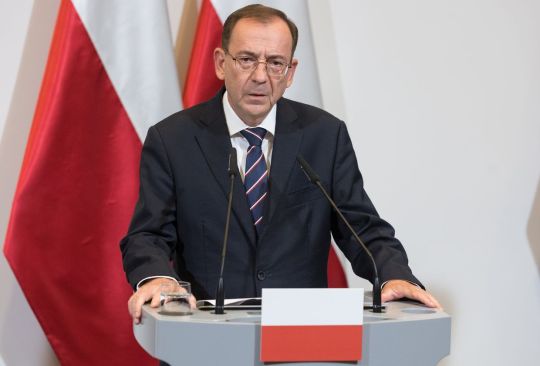
0 notes
Text
Recent developments:
Ukrainian officials say the country's forces have recaptured 193 square kilometers of territory since launching a counteroffensive last month.
Poland, ...
0 notes
Text
#Breaking: #Poland to close border for #Russian, #Belarusian trucks.
⚡️Poland to close border for Russian, Belarusian trucks.
Polish Interior Minister Mariusz Kaminski signed an order on May 29 suspending freight traffic for Russian and Belarusian vehicles across the border with Belarus, as reported by Polish news agency PAP.
— The Kyiv Independent (@KyivIndependent) May 29, 2023
Source: Twitter
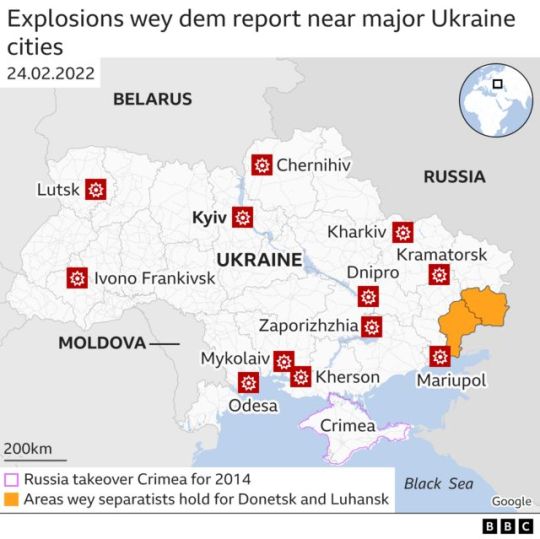
View On WordPress
0 notes
Photo

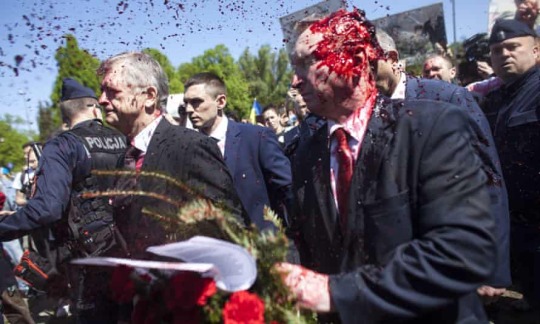
Russian ambassador to Poland pelted with red paint at VE Day gathering | Poland | The Guardian
Russia’s ambassador to Poland has been pelted with red paint thrown at him by people protesting against the war in Ukraine as he went to lay flowers at the Soviet military cemetery in Warsaw on the anniversary of the allied victory over Nazi Germany in 1945.
Video footage released by Russian news agencies showed Sergey Andreev and several other men with paint on their clothes and faces surrounded by a crowd, some holding Ukrainian flags. In other videos of the incident circulating online, anti-war activists can be heard chanting “fascists” and “murderers”.
Andreev told the Russian news agency Tass that he and his team had not been seriously hurt in the incident. The protesters prevented the ambassador from laying flowers at the cemetery and Polish police escorted him away.
Russia’s foreign ministry responded to the incident by demanding Warsaw organise a new wreath-laying ceremony immediately and saying Poland should “ensure complete protection against any provocations”. ...
... Poland, which has taken in millions of Ukrainian refugees, cancelled all official commemorations of the anniversary.
Speaking during a trip to Iran, the Polish foreign minister, Zbigniew Rau, said: “It is an incident that should not have happened, an incident that is, by all means, regrettable.” He said diplomats enjoyed special protection regardless of the policies pursued by the authorities of their countries.
The Polish interior minister, Mariusz Kaminski, tweeted: “The gathering of opponents of Russian aggression against Ukraine, where genocide takes place every day, was legal. The emotions of Ukrainian women participating in the demonstration, whose husbands courageously fight for the defence of the Motherland, are understandable.
“The Polish authorities did not recommend the Russian ambassador to lay flowers on 9 May in Warsaw. The police allowed the ambassador to safely leave the scene.” ...

#Poland#Protests#Activism#WELL DONE!!!#WHAT THE ACTUAL FUCK RUSSIA?!#Ukraine#Volodymyr Zelenskiy#All Needed Healing#OMFG#russia#EVIL#rootin' tootin' vladimir putin#war crimes#genocide
10 notes
·
View notes
Text
In Europe, Tech Battle Against Coronavirus Clashes With Privacy Culture
https://sciencespies.com/news/in-europe-tech-battle-against-coronavirus-clashes-with-privacy-culture/
In Europe, Tech Battle Against Coronavirus Clashes With Privacy Culture
Governments across Europe are turning to technology to track the spread of the coronavirus and monitor people under quarantine, an approach that seeks to learn from Asia but is also putting the region’s privacy rules to the test.
From Helsinki to Madrid, applications are being developed for people to report their symptoms to doctors and researchers; to trace and model the spread of the flu-like virus; and ensure that those under quarantine stay at home.
Yet progress has been patchy, there is scant coordination, and privacy advocates caution there is a trade-off between any benefits to public health and digital surveillance that the European Union’s privacy rulebook, the General Data Protection Regulation (GDPR), seeks to prevent.
Take Poland: The government has just launched a smartphone app, called Home Quarantine, for citizens returning from abroad who have since March 15 been required to self-isolate for two weeks.
To register, they upload personal details and a photo. They are then sent reminders via text message and should respond within 20 minutes by uploading a new selfie. This is verified by facial recognition and its location stamp is checked against the registered address.
Kamil Pokora, a product manager who has just returned to Gdansk from a holiday in Thailand, said police were checking in on him, as is mandatory. He is also using Home Quarantine, which is voluntary, but finds that it doesn’t work properly.
“It has many errors,” said Pokora, 37. “I keep getting asked to perform tasks which are not even included in the app. It isn’t user friendly.”
Poland’s Personal Data Protection Office, responsible for enforcing the GDPR, said it was not consulted about Home Quarantine. Spokesman Adam Sanocki said it would monitor the deployment and, should it find irregularities, would take action to ensure personal data are protected.
Asked about the criticisms, Poland’s digital ministry said it constantly monitored the system and improved it when necessary, helped by feedback from users.
Interior Minister Mariusz Kaminski said on Wednesday the government planned to make Home Quarantine compulsory for everyone under quarantine.
The Asian way
Home Quarantine copies the proactive and, so far, effective approach taken by Taiwan, which has just upgraded its arsenal with a mobile phone-based “electronic fence” to keep at-risk individuals at home.
Taiwan, which has one of the lowest coronavirus tolls in Asia, already requires arrivals from abroad to download a questionnaire and report the airport they came from, their 14-day travel history and health symptoms.
Those assessed to have low risk get a text message telling them they are free to travel. Those deemed to pose a risk must self-isolate for 14 days, with their compliance monitored using location data from their smartphones.
Under the GDPR, consent to processing sensitive personal data should be freely given and there are far-ranging constraints on its use. For example, it should not be stored indefinitely or used for another purpose.
Berlin-based privacy expert Frederike Kaltheuner, a tech policy fellow at the Mozilla Foundation, said there needed to be clear evidence tech solutions were worth privacy compromises: “In other words: we need to know that these tools actually work.”
In Finland, national newspaper Helsingin Sanomat and software developer Futurice are close to launching a Web and mobile service for people to report their respiratory symptoms.
The only personal information that people report is their age and postcode, information the app’s backers say will help map the spread of the pandemic. The government, while supportive, has not yet officially backed the initiative.
‘Spying law’Elsewhere, governments are rushing to pass emergency laws to allow the use of individual smartphone data to trace contacts and enforce quarantines – even if they haven’t yet obtained the technology to do so.
Slovakia this week proposed temporary legislation that would allow individual movements to be tracked for the duration of the pandemic.
This represents a huge infringement of human rights and freedoms, Justice Minister Maria Kolikova told parliament, adding, however, that she believed the right to life was absolute.
Former Prime Minister Robert Fico slammed the legislation as a “spying law”.
A proposal by German Health Minister Jens Spahn to allow individual smartphone tracking without a judicial order was blocked by the Social Democrats (SPD), the junior partner in Chancellor Angela Merkel’s coalition.
“This would be a wide-ranging intrusion into civic rights,” said Justice Minister Christine Lambrecht of the SPD.
Germany’s leading virologist, Christian Drosten, said the use of individual location data for contact tracing, as in South Korea, would still need to be backed up by well staffed health teams able to interview large numbers of coronavirus victims and trace people who may have been exposed to them.
Germany lacks those resources, and so “for me, the question as to whether we can learn something from them is a bit futile,” Drosten, director of the Institute of Virology at Berlin’s Charite hospital in Berlin, said in a podcast for NDR radio.
Hackathons, grassroot initiatives
Alarmed by an explosion in infections and fatalities, several countries have launched ‘hackathons’, or brainstorming sessions where software developers team up to search for new technology solutions.
In hardest-hit Italy, the government has appealed to companies to come forward with solutions, while data scientist Ottavio Crivaro is leading a grassroots appeal for people to donate their data to help map the pandemic.
Experts note some of these problems have already been solved elsewhere – Singapore for example has launched the TraceTogether app that collects smartphone location and Bluetooth data from volunteers to check whether they have been in proximity with someone infected with coronavirus.
A focus on technology may also detract from simpler answers.
India, for example, allows the use of indelible ink to stamp the hands of people in quarantine – a variation on its system to prevent people voting more than once in elections.
“There’s often a low-tech solution to these problems,” said Edin Omanovic, advocacy director at Privacy International, a non-governmental organisation. “With quarantine, sometimes the best thing is just to go and have a look.”
© Thomson Reuters 2020
#News
3 notes
·
View notes
Photo
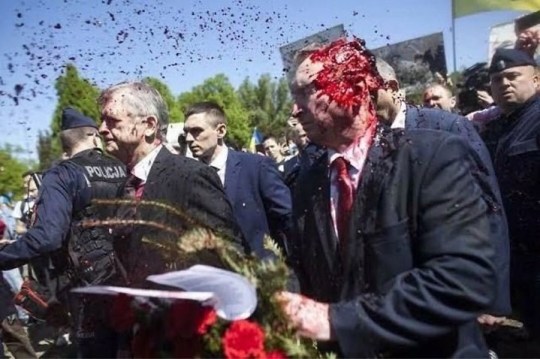
From • @the_amateur_historian Russian Ambassador to Poland Sergey Andreev being pelted with red paint by anti-war activists in Warsaw yesterday. Ambassador Andreev was taking part in local V-E Day celebrations at a Red Army cemetery in the Polish capital and was laying flowers there when he was pelted. As he was pelted with paint, he was called a fascist and a murderer by the activists, many of whom were wearing Ukrainian colors. Poland's Foreign Minister Zbigniew Rau described the incident as "highly deplorable", while Interior Minister Mariusz Kaminski was quoted as saying: "The gathering of opponents of Russian aggression in Ukraine, where the crime of genocide takes place every day, was legal." He went on to say that the emotions of the anti-war activists who pelted the ambassador was "understandable", and that the ambassador was advised against laying flowers at the cemetery. Russia's Foreign Ministry spokeswoman Maria Zakharova condemned the incident and said that Russia would not be intimidated. She went on to say that the peoples of Europe should "look in a mirror", and that what happened to Ambassador Andreev was proof that "Nazism is reemerging across the European continent." https://www.instagram.com/p/CdX0YFsOEjKj-svvYYJnbSTnavghJS3hW4hZmY0/?igshid=NGJjMDIxMWI=
0 notes
Text
The German government announced on Wednesday extended controls at its borders with Poland and Czechia as of this week, following on the heels of a Polish government announcement the day before that it is considering introducing controls on its side of the border.
“If we do not succeed in better protecting the external borders… then the open borders within the EU are in danger,” German Interior Minister Nancy Faeser told reporters when announcing the new measures.
The German Federal Police would conduct “additional, flexible checks on the smuggling routes at the borders with Poland and Czechia,” German media reported, specifying that these would be additional to the random searches already occurring. An extra 500 officers would be deployed to the two borders for this task.
Despite media speculation ahead of the announcement, no stationary controls at border posts were announced.
The news from Germany is the latest in a series of comments about border controls within the EU’s visa-free Schengen Area made by politicians from both Germany and Poland as they hit the campaign trail and need to talk tough over illegal migration, worries about which are rising among their respective populations. The Polish government is facing a general election on October 15 for which the government and opposition alliance are neck and neck.
On Tuesday night, Piotr Muller, a spokesperson for the Polish government, said during an interview with local media that Poland too was considering “some controls on the Polish-German border on our side”.
“We are afraid that at any moment there will be traffic from Italy,” the spokesperson added, referring to the huge influx of migrants from Tunisia to the Italian island of Lampedusa over the last few weeks.
The German government began raising the possibility of reintroducing stationary checks on the borders with Poland and Czechia earlier in the year following a rise in the numbers of migrants crossing over into German territory this year.
According to Gazeta Wyborcza, at the main refugee reception centre in eastern Germany, Eisenhuttenstadt nearby Franfurt-Oder, there are now 1,800 people being registered each month, as opposed to about 1,000 one year ago.
Some 204,000 people requested asylum in Germany in the first eight months of 2023, an increase of 77 per cent compared with the same period in 2022, according to data quoted by Politico Europe. Only a fraction of these come to Germany via Poland.
The Polish Border Guard said there were over 21,000 attempted irregular entries into Poland over the Belarus-Polish border between January and August. Many of those who succeed in crossing are making their way to Germany directly. Additionally, migrants coming via the Balkan route are increasingly making their way to the West through Slovakia via southern Poland.
Also on Tuesday, Polish Interior Minister Mariusz Kaminski said Poland introduced checks on some vehicles crossing the Slovak-Polish border if border guards suspected they might be carrying migrants.
The Polish government is facing a general election on October 15, where it is nervous about achieving a parliamentary majority. The Law and Justice (PiS) party has made its efforts to combat illegal immigration a core message of its campaign, even going so far as to organise a referendum on the matter on the same day as the general election.
This strategy has, to a degree, backfired against the government, when in early September the Polish media revealed a corruption scandal at the Ministry of Foreign Affairs, whereby thousands of migrant workers from Asia and Africa appear to have been granted visas to come to Poland as a result of fraudulent interventions by PiS politicians.
Both Germany and the European Commission have asked the Polish government for clarifications about the circumstances under which they allowed these migrants to enter the Schengen Area.
Speaking at a rally in Nurnberg over the weekend, German Chancellor Olaf Scholz said: “I don’t want Poland to simply wave people through and then have a discussion about our own asylum policy afterwards.”
Germany is facing regional elections on October 8 in the states of Bavaria and Hesse, in which the far-right AfD party poses a strong challenge to the governing coalition, making migration a key electoral issue here too. Faeser herself is running to be premier in Hesse on the side of Scholz’s centre-left Social Democratic Party (SPD).
For Mikolaj Pawlak, a sociologist specialising in migration at Warsaw University, the reason illegal migration has become such an election issue is because of the politicians themselves. “This talk of border closures is clearly politicians on the campaign trail wanting to bring the attention of the public to the issue of migration – both in Poland and in Germany,” Pawlak argued.
“The numbers are not so dramatic that this could not be dealt with by cooperation among border guards of the various countries. Plus, the Schengen zone already has mechanisms to address these kinds of problems. The Dublin regulation, relating to the return of migrants to the first EU country they entered, is being amended now, but has been working for many years,” he said. “However, what we are dealing with today is a will to make dramatic statements rather than to solve the issues pragmatically.”
0 notes
Text
Poland responds to attack on Russian envoy in Warsaw
Poland responds to attack on Russian envoy in Warsaw
The emotions of protesters who threw liquid at the diplomat were “understandable,” the interior minister said
Polish Interior Minister Mariusz Kaminski has said that the pro-Ukraine protesters who threw red liquid at Sergey Andreyev, Russia’s ambassador to the country, in Warsaw had legitimate reasons to be angry at him.
Andreyev was attacked as he was about to lay flowers in honor of fallen…
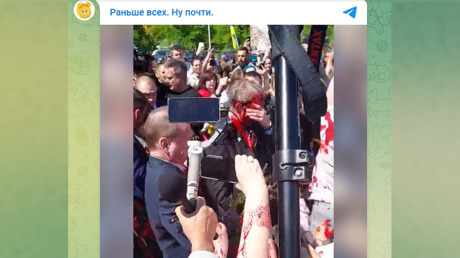
View On WordPress
0 notes
Text
Russia vows to respond after Poland expels 45 Russian diplomats it says are spies
Russia vows to respond after Poland expels 45 Russian diplomats it says are spies
“Poland expelled 45 Russian spies pretending to be diplomats,” Poland’s interior minister, Mariusz Kaminski, Wednesday said on Twitter. “With full consistency and determination, we are breaking up the agents of the Russian secret services in our country.”
Stanislaw Zaryn, a spokesman for Poland’s security services, told The Post that the 45 included individuals known to be working for Russia’s…
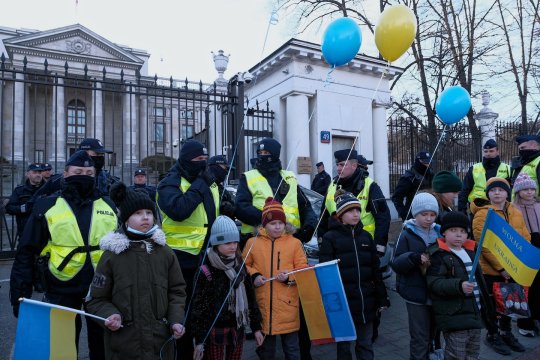
View On WordPress
0 notes
Text
Poland preparing for potential influx of Ukrainian refugees: Minister
Poland preparing for potential influx of Ukrainian refugees: Minister
Poland is preparing for “various scenarios” for a possible influx of refugees if Russia were to attack Ukraine, Interior Minister Mariusz Kaminski said on Sunday.
For the latest headlines, follow our Google News channel online or via the app.
Washington has said Russia, which has more than 100,000 troops massed near Ukraine, could invade at any moment. Moscow denies having any such plans.
“In…
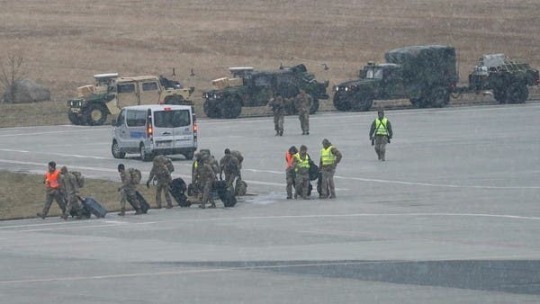
View On WordPress
0 notes
Text
#Breaking: #Poland has broken up a #Russian #espionage network operating in the country and detained nine people.
Poland has broken up a Russian espionage network operating in the country and detained nine people it says were preparing acts of sabotage and monitoring rail routes to Ukraine, interior minister Mariusz Kaminski said https://t.co/mCqbhZWyYE 1/6 pic.twitter.com/B480laOkeL
— Reuters (@Reuters) March 16, 2023
Source: Twitter

View On WordPress
0 notes